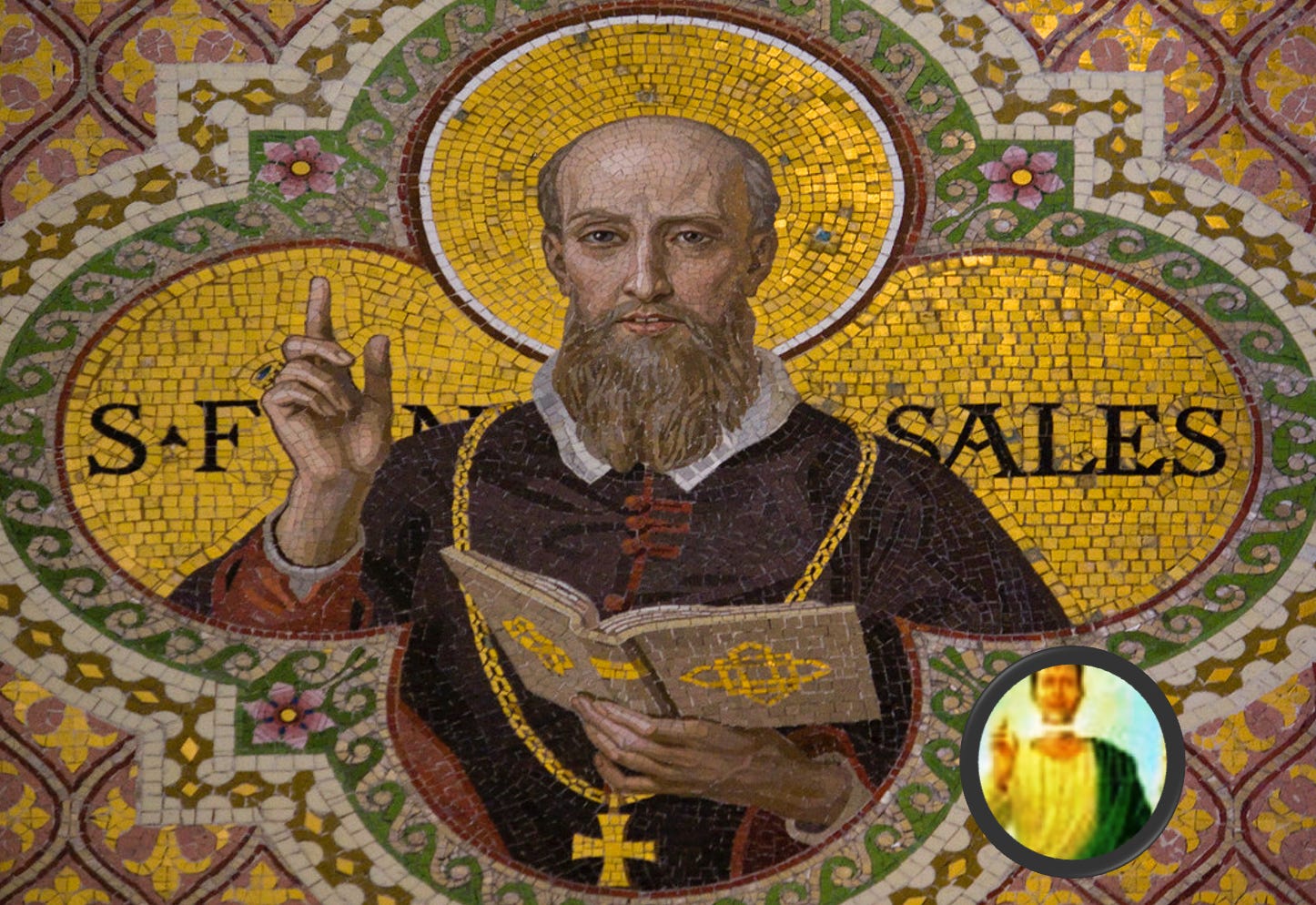St. Francis de Sales, Model for Journalists and Citizens
Lessons from Sts. Francis and Dallan for Modern America
Today in the old Latin Mass calendar is the feast of St. Francis de Sales. He was a truly remarkable man, passionate yet gentle, a fighter of heresy and a loving pastor, a writer and preacher, one of the greatest minds of the Catholic Reformation.
Francis de Sales was a Frenchman trained as a lawyer who chose to become a priest. Assigned to the diocese of Geneva in Switzerland, a hotbed of heretical Calvinism, Francis converted many back to Catholicism through his preaching and pamphlets. He later became bishop of Geneva and was a gentle and charitable pastor, arguing, “A spoonful of honey attracts more flies than a barrelful of vinegar.”
His writings and preaching particularly focus on helping laypeople live holy lives in the world. In his The Introduction to the Devout Life (an excellent read still today), Francis wrote: “It is an error, or rather a heresy, to say devotion is incompatible with the life of a soldier, a tradesman, a prince, or a married woman … It has happened that many have lost perfection in the desert who had preserved it in the world.” Francis helped St. Jane Frances de Chantal to establish the Sisters of the Visitation, and died in 1622.
Another writer saint we celebrate today is St. Dallan Forghaill, a 6th century Irish royal who went blind but still became the chief bard and poet of Ireland. He preserved Gaelic language and literature, and penned works including the Eulogy of Saint Columba and, most famously, the hymn we know as Be Thou My Vision. It is significant that a blind poet should have begged God to be his vision; Dallan might have lacked physical sight, but he knew that God could give him a spiritual insight far more penetrating and lasting than any earthly sight. Like Francis, Dallan understood that the truth must be spoken fearlessly regardless of risk, as he was martyred by pirates. Yet he also knew how to do it in so moving, beautiful, and loving a fashion that we still sing his hymn today, more than 1000 years after he died.
Francis and Dallan can provide valuable lessons to Christians in general, to concerned citizens, and to writers in particular. Protestants claimed to be “reforming” the Church by rejecting her God-given authority and breaking off into smaller groups, denying or ignoring certain passages of Scripture (such as those prohibiting divorce and saying faith alone is not sufficient). It’s a fracturing process that has continued to our present day, as tens of thousands of different denominations each claim to have the only true interpretation of the Bible. But Francis and Dallan both knew that the Church is a hospital for sinners; one reforms an institution by staying within it, not by leaving it. We can apply that lesson not only to our practice of Christianity but also to our political lives, as it is important for us to stay loyal to America now that she needs us most, not to abandon her as a lost cause.
I have a particular devotion to Francis de Sales as he is the patron saint of journalists. If only every journalist had both the dedication to truth and the real concern for each individual—even one’s ideological opponents—that St. Francis de Sales did! If only we all had his integrity, his honesty, and his eloquence! Unfortunately, the overwhelming majority of journalists—including “conservatives”—care far more for pushing an ideological narrative and/or not being targeted by the powers-that-be than about anything else. De Sales changed hearts and minds because he knew what he believed and would brook no compromise with the truth. That can be said of very, very, very few journalists now. We are largely either amoral leftist mouthpieces or craven cowards.
But both journalists and laymen of all professions, the laymen who were such a focus of Francis’s ministry, can learn from Francis’s example. Do we argue with the opposition simply for our own satisfaction or for “trolling” or because we hate our opposition? Don’t get me wrong, we are supposed to hate the evil acts of those we oppose, but I find myself often falling into the too-easy trap of loathing the people themselves.
Both De Sales and Dallan were fearless defenders of truth, and yet full of love and joy. That was especially hard for the naturally choleric Francis. Charity doesn’t mean we have to entertain sappy thoughts about wicked people, or refuse to call out sin for what it is, or hope justice is not served, or refrain from rebuking evil because it might offend people. But it does mean that we should be motivated by a zeal to see every man turn from evil to goodness, a desire to change hearts not only for our good but their good as well. Jesus died for and loves all men, and many holy men and women were murderers or demon-worshippers or adulterers or violent criminals before they were saints.
Do we merely want to conquer the other side or to rebuild a great nation and a holy people of God? There are some brave fighters now challenging institutional evil who but a few short years ago were far-left ideologues. Whole societies have been convinced to change their minds on such topics as slavery and liberty and sexual perversion. Like De Sales and Dallan, let us go forth to fight evil and speak the truth with every ounce of our strength, but keep the love of Christ always alive within our hearts.




